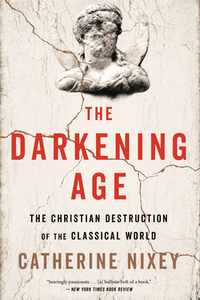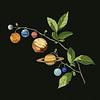Take a photo of a barcode or cover
265 reviews for:
The Darkening Age: The Christian Destruction of the Classical World
Catherine Nixey
265 reviews for:
The Darkening Age: The Christian Destruction of the Classical World
Catherine Nixey
informative
slow-paced
challenging
dark
emotional
informative
reflective
slow-paced
Now this is a micro-history book! It makes some BIG claims throughout, but they are well researched and justifiably have some teeth to them. Nixey is a great writer. She managed to write a history book that was organized (amazing. Seriously. I can't tell you how many rambling history books I've read), interesting, and didn't throw a million dates at the readers. Everything is introduced, explained, and engaging. I learned a lot about a movement that I knew next to nothing about. It truly is the dark side to the 'Triumph of Christianity.'
One thing though - I would take some of the facts written down with a grain of salt. Like she says, history is written by the winners and we have lost a lot of what happened back then. The Nero section is summarized for context but written as fact, except most of those points about him were written by those that came into power after him and despised him. Was he a bad emperor? Almost definitely. Did all of those things about him really happen? Probably not.
The sass in this book is real though. Nixey wants to be respectful of Christianity and religions, but it is hard to do that when the entire book puts Christianity on blast. I can see how a Christian reader could get upset by this. Though it is good to know your history - even the darker side of it!
One thing though - I would take some of the facts written down with a grain of salt. Like she says, history is written by the winners and we have lost a lot of what happened back then. The Nero section is summarized for context but written as fact, except most of those points about him were written by those that came into power after him and despised him. Was he a bad emperor? Almost definitely. Did all of those things about him really happen? Probably not.
The sass in this book is real though. Nixey wants to be respectful of Christianity and religions, but it is hard to do that when the entire book puts Christianity on blast. I can see how a Christian reader could get upset by this. Though it is good to know your history - even the darker side of it!
Brilliant in generating an atmosphere of the violence impossition of Christianity upon Europe, but I missed more depth in the data (maybe a map, a timeline, some numbers etc.).
Un importante ensayo para poner en justa dimensión el impacto, para mal, del cristianismo sobre el mundo clásico. Importantísimo para una época en la que tan pocas cosas se ponen en duda.
challenging
informative
reflective
sad
slow-paced
The Darkening Age is a very readable book about a very depressing subject: the loss of knowledge, art and culture from the classical world when Christianity became mainstream. You often hear people saying that Christian monasteries preserved classical knowledge and literature, and it's true -- there are manuscripts which only survived because they were held in monasteries.
Unfortunately, as Catherine Nixey discusses at length, much more was destroyed by Christianity. Deliberately, purposefully, and with malice. Temples were torn down, books burned, inscriptions destroyed, etc, etc. If Christianity had truly been such a preserving force, we'd have a lot more than we do now, perhaps. Nixey goes through it step by step, the initial period of co-existence (and the fact that evidence suggests Christians were not persecuted nearly as much as they liked to think they were) and then the ramping up of hostilities, the sanctioned-and-encouraged utter destruction of "pagan" idols and temples, etc.
For such a heavy subject, it really is a very readable book, and I pretty much tore through it. It gets perhaps a bit repetitive, and other reviews are right to point out that there were other causes of the loss of texts, destructions of temples, etc.
The author is a journalist, rather than a historian, and the text is pretty much uninterrupted by footnotes/sourcing, so definitely be aware that it's very much a popular history, and flavoured by opinion, rather than being an academic work. I found it an absorbing read!
Unfortunately, as Catherine Nixey discusses at length, much more was destroyed by Christianity. Deliberately, purposefully, and with malice. Temples were torn down, books burned, inscriptions destroyed, etc, etc. If Christianity had truly been such a preserving force, we'd have a lot more than we do now, perhaps. Nixey goes through it step by step, the initial period of co-existence (and the fact that evidence suggests Christians were not persecuted nearly as much as they liked to think they were) and then the ramping up of hostilities, the sanctioned-and-encouraged utter destruction of "pagan" idols and temples, etc.
For such a heavy subject, it really is a very readable book, and I pretty much tore through it. It gets perhaps a bit repetitive, and other reviews are right to point out that there were other causes of the loss of texts, destructions of temples, etc.
The author is a journalist, rather than a historian, and the text is pretty much uninterrupted by footnotes/sourcing, so definitely be aware that it's very much a popular history, and flavoured by opinion, rather than being an academic work. I found it an absorbing read!
I listened to this on audio. A very interesting listen with lots of details/stories that I'd never heard before. Essential reading for anyone who thought they knew the history of early Christianity and how we entered the dark ages.
adventurous
dark
informative
medium-paced
I read a ton of reviews of this book beforehand trying to figure out whether it was worth reading or not, and then I finally just decided the only way I would find out is to read it myself. This book felt like a mix of history and journalism. The author no doubt writes to evoke vivid imagery, creating a dramatic story, but also I think adding a lot of value judgements— romanticizing Greco-Roman culture at times for one, which like all cultures was less than perfect (not that this claim is ever made nor does it justify the culture’s decimation). A lot of the criticism I’ve read comes from her generalizations on Christian attitudes and the difficulty of context when it comes to quoting such ancient texts.
So overall, it was interesting, but I think it’s better read from a macro view: this presents historical religious oppression, but extremism is not merely a historical problem; in fact, the author writes that one of statues of Athena that was destroyed in this period, and then later restored as best it could be, has been destroyed again in modern day by ISIS. In a broader sense, this book demonstrates that extreme tribalism, whether that be allegiance to religion, nation, or language, can lead to oppression. Her methodological note in the introduction is important, but I’m not sure if it totally justifies the way she chooses to write about this history. I think it’s probably best read if you have a base understanding of the time period since it doesn’t explore all the interesting facets of the rise of Christendom and the decline of Athenian philosophy; it isn’t a very nuanced presentation. Barbarian invasions as a cause of Greco-Roman art destruction is only briefly mentioned once. Furthermore, nowhere is the misnomer “Dark Ages” or the preservation/advancement of sciences and humanities in the Islamic Empire mentioned.
So overall, it was interesting, but I think it’s better read from a macro view: this presents historical religious oppression, but extremism is not merely a historical problem; in fact, the author writes that one of statues of Athena that was destroyed in this period, and then later restored as best it could be, has been destroyed again in modern day by ISIS. In a broader sense, this book demonstrates that extreme tribalism, whether that be allegiance to religion, nation, or language, can lead to oppression. Her methodological note in the introduction is important, but I’m not sure if it totally justifies the way she chooses to write about this history. I think it’s probably best read if you have a base understanding of the time period since it doesn’t explore all the interesting facets of the rise of Christendom and the decline of Athenian philosophy; it isn’t a very nuanced presentation. Barbarian invasions as a cause of Greco-Roman art destruction is only briefly mentioned once. Furthermore, nowhere is the misnomer “Dark Ages” or the preservation/advancement of sciences and humanities in the Islamic Empire mentioned.
The book was less comprehensive and more episodic than I expected.
I don't mind some Christian-bashing, as I am well aware of the many atrocities committed over the centuries in the name of "God", especially against women.
But I expected more of this book and it didn't deliver.
I don't mind some Christian-bashing, as I am well aware of the many atrocities committed over the centuries in the name of "God", especially against women.
But I expected more of this book and it didn't deliver.





